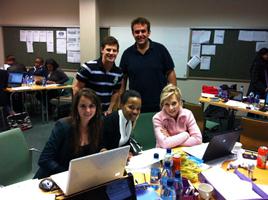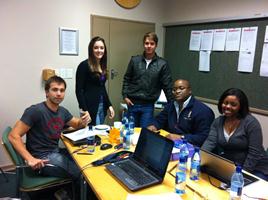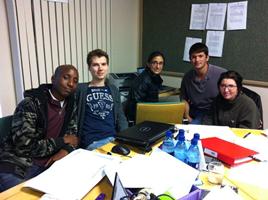Posted on November 16, 2012
The simulation is presented annually since 2003 by the Unit for Supply Chain Management in the Department of Business Management and is facilitated by Mr Wesley Niemann, a lecturer in the Department, with the assistance of a team of technical support staff.
The simulation creates a realistic business environment wherein competing teams of students are challenged with managing a business over the course of a number of decision-making cycles. Student teams are cast in the role of a fresh executive management team hired by the CEO of a severely financially and operationally troubled biscuit manufacturing company.
Armed with knowledge gained through four years of study and an overwhelming amount of company and industry information from the simulated environment, the new executive is mandated to return the company to profitability and presenting its progress to the CEO at a quarterly board meeting. The teams are tasked with developing and implementing a strategy to run the company’s supply chain as an integrated whole by aligning demand, supply, production operations, and distribution.
During the simulation, teams are required to make decisions in a highly pressurised environment when they are faced with a variety of challenging business problems and scenarios. The actions of the competing teams, market and industry dynamics, as well as changing conditions in the economic environment in which the companies operate make for a dynamic simulated business environment with numerous challenges that often require a fair amount of creative problem-solving and negotiation with suppliers and customers.
The Supply Chain Challenge provides students with an opportunity to apply their skills and knowledge in a realistic environment. The students get the opportunity to experience the outcomes of the decisions they make.
“The use of simulation tools is one of the best ways to become ‘business fit’ and the students get the unique opportunity to gain years of management experience in only two days. Students also learn the importance of collaboration, not only across functional areas within an organisation, but throughout the supply chain, and how a collaborative and integrated supply chain creates value for all involved”, says Mr Niemann.
For many students the Supply Chain Challenge was not only an immensely challenging and stressful experience, but also an exciting and enjoyable one. The Bakers Biscuit team managed to align their supply chain best.
|
|
 Edelweiss team – Alana Woods, Duncan Platt, Matthew Milton, Nox Dube & Kerry Baldwin |
 Sam’s team –Monica Bridges, Kabello Matlala, Denise Vermaak, Andrew Haas & Gideon Slabbert |
 Biscuit Factory team –- Francois Schutte, Emma Shaw, Gerhardt Schutte, Trever Thokoane & Nobukhosi Baloyi |
 Select biscuits team – Karen Terblanche, Betsi Kgari, Rianda Reyneke, Mpumelelo Khumalo & Andrew Christie |
 Bakers team – Bahati Mayeka, Dewald Benadie, Shaa’ista Suliman, Gert Brits & Danelle Jonker |
Copyright © University of Pretoria 2025. All rights reserved.
Get Social With Us
Download the UP Mobile App